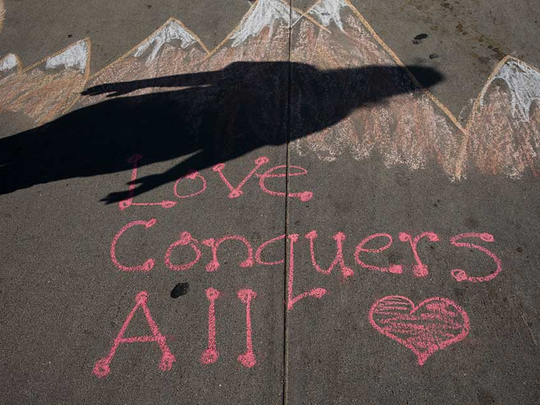
North Brunswick, New Jersey: Jolted into action by a wave of hate crimes that followed the election victory of Donald Trump, American Muslims and Jews are banding together in a surprising new alliance.
They are putting aside for now their divisions over Israel to join forces to resist whatever may come next. New groups are forming, and interfaith coalitions that already existed say interest is increasing.
Vaseem Firdaus, a Muslim who has lived in the United States for 42 years, spent Friday night at a Shabbat dinner for members of a women’s group called the Sisterhood of Salaam Shalom, in a home here filled with Jewish art and ritual objects.
Until Trump was elected president, Firdaus, who is 56 and a manufacturing manager at Exxon Mobil, felt secure living as a Muslim in America. She has a daughter who is a doctor and a son who is an engineer, and she recently travelled to Tampa, Florida, with her husband looking to buy a vacation home. But Trump’s victory has shaken her sense of comfort and security.
After joining in blessings over home-baked challah and sparkling grape juice (instead of wine, out of consideration for the Muslims), Firdaus talked with four Jewish women she had never met before, balancing plates of Indian food on their laps. They found that the spate of hate crimes and the ominous talk by Trump or his advisers about barring Muslims from entering the country and registering those living here had caused all of them to think about Germany in the years before the Holocaust.
“When did you know it was time to leave?” Firdaus asked one woman who had just recounted how her relatives had fled the Nazis. “The ones that didn’t leave are the ones who went to Auschwitz.”
The Jewish women tried to convince her that they would not let it come to that. “If Muslims have to register, we’re all going to register,” said Mahela Morrow-Jones, who is helping to build the first West Coast chapter of the Sisterhood in Santa Barbara, California. “You’ve got to believe it, sister.”
Groups are reaching out not just to clergy members, but also to laypeople, including business executives, students and women.
Jonathan Greenblatt, the chief executive of the Anti-Defamation League, said in a recent interview: “Jews know what it means to be identified and tagged, to be registered and pulled aside. It evokes very deep emotions in the Jewish community.”
Nearly 500 Muslim and Jewish women, many wearing headscarves and skullcaps, gathered Sunday at Drew University in Madison, New Jersey, in what organisers said was the largest such meeting ever held in the United States. It was the third annual conference of the Sisterhood, a grass-roots group that now claims 50 chapters in more than 20 states. The first conference two years ago drew only 100 people.
The women spread out inside an enormous sports complex and met in clusters to study sacred texts on the racquetball courts, practice self-defence techniques in the dance studio and, in the bleachers, discuss how to talk to friends whose impression of Islam had been shaped entirely by news of terrorist attacks.
Over lunch and in the hallways, they traded stories about the latest ugly outbreaks back home: a brick thrown through the window of a Muslim-owned restaurant in Kansas, apartments of Muslim families in Virginia hit with eggs and graffiti, swastikas scrawled on synagogues and in a playground in New York. Sisterhood chapters keep track of the incidents on their Facebook pages and other social media.
“Ignorance is one of the key triggers of hate,” said Sheryl Olitzky, the group’s executive director, in her opening remarks. “We need to show the world that we are Americans. We are here because we love each other and we’re overcoming hate.”
Olitzky, a marketing executive whose husband and two sons are rabbis, started the first Sisterhood women’s meeting in New Jersey six years ago on the theory that “women navigate the world through relationships.” She baked the challah and hosted the Shabbat dinner on Friday night at her home.
The Sisterhood is one of several groups expanding their work on Muslim-Jewish relations: The Foundation for Ethnic Understanding started an initiative to elevate Muslim condemnations of terrorism, which are often ignored by the news media. The Anti-Defamation League is increasing its work against anti-Muslim bigotry.
Despite the new cooperation, tensions over Israel continue to flare up. Several Jewish groups, including the Anti-Defamation League, recently declared their opposition to a bid by Representative Keith Ellison of Minnesota, who is a Muslim, to become chairman of the Democratic National Committee because of critical statements he has made about Israel.
And the embrace of Muslims is hardly universal. A few Jewish groups have applauded Trump’s hard line on Muslims, and cheered his choice of Lt. Gen. Michael T. Flynn to be national security adviser. The retired general has called Islam “a cancer” and a “political ideology” masquerading as a faith.
The selection of Flynn prompted the usually stoic Firdaus to rethink her situation. She abandoned the plan to buy a vacation home in Tampa, or anywhere in the United States, at least for now. Instead, she and her family will spend Christmas vacation in Toronto, where they intend to open a bank account and look for a condominium to buy — just in case they have to flee.
Attending the Sisterhood conference Sunday, however, Firdaus said she was feeling a bit more optimistic. She was surrounded by Jews who pledged not to abandon Muslims. Senator Cory Booker of New Jersey brought the women to their feet cheering with stories of how in history’s darkest times, love had conquered hate.
“Sitting here makes you feel it’s really not so hopeless. This is food for the soul,” Firdaus said. “But there were 60 million people who voted for Trump. I’m not ready to leave, but you have to have a plan.”












